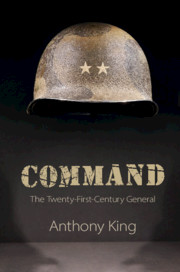Crossref Citations
This Book has been
cited by the following publications. This list is generated based on data provided by Crossref.
Collins, Randall
2019.
Reply to Thesis Eleven symposium.
Thesis Eleven,
Vol. 154,
Issue. 1,
p.
124.
Masuhr, Niklas
2020.
Operative Anpassung von NATO-Streitkräften seit der Krim: Muster und Divergenzen.
SIRIUS – Zeitschrift für Strategische Analysen,
Vol. 4,
Issue. 2,
p.
170.
Buisson, Jeremy
M, Jean Levrai Mbeck
and
Belloir, Nicolas
2020.
Digitalization in Next Generation C2: Research Agenda from Model-Based Engineering Perspective.
p.
000243.
K. Ledberg, Sofia
and
Ruffa, Chiara
2020.
Handbook of Military Sciences.
p.
1.
Crosbie, Thomas
2021.
Militarization and the Global Rise of Paramilitary Culture.
p.
17.
King, Anthony
2021.
Operation Moshtarak: Counter-insurgency command in Kandahar 2009-10.
Journal of Strategic Studies,
Vol. 44,
Issue. 1,
p.
36.
Bury, Patrick
2021.
Conceptualising the quiet revolution: the post-Fordist revolution in western military logistics.
European Security,
Vol. 30,
Issue. 1,
p.
112.
King, Anthony
2021.
Broadening the Perspective on Military Cohesion? A Reply.
Armed Forces & Society,
Vol. 47,
Issue. 3,
p.
586.
zu Drewer, Peter Meyer
and
Schmitz, Hans-Christian
2021.
Integrating Command & Control, Constructive Simulation and Artificial Intelligence.
p.
1.
Belloir, Nicolas
Buisson, Jérémy
and
Touseau, Lionel
2022.
Developments and Advances in Defense and Security.
Vol. 255,
Issue. ,
p.
205.
Käihkö, Ilmari
2022.
‘Once a combatant, always a combatant’? Revisiting assumptions about Liberian former combatant networks.
The Journal of Modern African Studies,
Vol. 60,
Issue. 1,
p.
23.
Resteigne, Delphine
2022.
Handbook of Military Sciences.
p.
1.
Johnson, James
2023.
Automating the OODA loop in the age of intelligent machines: reaffirming the role of humans in command-and-control decision-making in the digital age.
Defence Studies,
Vol. 23,
Issue. 1,
p.
43.
Sjøgren, Søren
2023.
What we disagree about when we disagree about doctrine.
Journal of Strategic Studies,
p.
1.
Carr, Andrew Ossie
2023.
Singing from the same song sheet: paradiplomacy and federalism in an era of weaponised interdependence.
Australian Journal of Political Science,
Vol. 58,
Issue. 2,
p.
141.
Tripodi, Christian
2023.
Hidden hands: The failure of population-centric counterinsurgency in Afghanistan 2008-11.
Journal of Strategic Studies,
p.
1.
Obling, Anne Roelsgaard
2023.
Professional identity reconstruction: Attempts to match people with new role expectations and environmental demands.
Management Learning,
Vol. 54,
Issue. 4,
p.
468.
Rossiter, Ash
2023.
AI-enabled remote warfare: sustaining the western Warfare paradigm?.
International Politics,
Vol. 60,
Issue. 4,
p.
818.
King, Anthony
and
Bury, Patrick
2023.
How (Not) to Win a Medal: Military Professionalism, Gallantry Awards, and the Problem of Fraud.
Armed Forces & Society,
p.
0095327X2311601.
Neads, Alex
Farrell, Theo
and
Galbreath, David J.
2023.
Evolving towards military innovation: AI and the Australian Army.
Journal of Strategic Studies,
p.
1.





